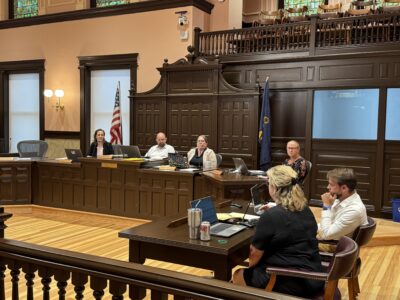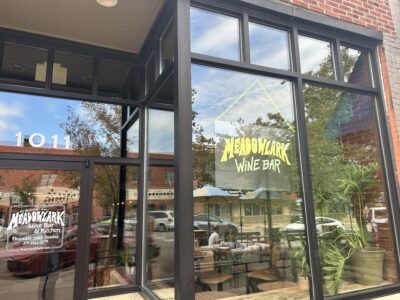Rehab facility in a converted Lawrence motel has turned a place of deep lows into ‘a place that rebuilds lives’
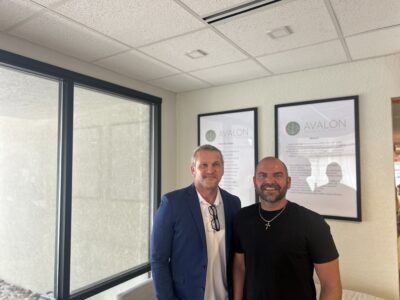
photo by: Bremen Keasey
David Hawley (left) and Aaron Thakker at Lawrence's Avalon Wellness and Recovery Center, 801 Iowa St. The two helped found the 60-bed center — Lawrence's first in-patient center for drug and alcohol treatment — and hope to be fill a treatment gap for patients with substance use disorder.
It took a few years for David Hawley’s vision of an alcohol and drug treatment center in Lawrence to open, but only a few months for it to receive a big sign that it’s doing something right.
Hawley, the owner of Papa Keno’s pizzeria and someone who has been in recovery for 20 years, and co-founder Aaron Thakker, the owner of a Eudora construction company, made initial steps in September 2023 to create what would become Avalon Wellness and Recovery Center, buying a Super 8 motel with plans to convert it into a rehab facility. The center, which provides medical assisted detox to patients as well as residential treatment for substance use disorder, opened its doors to patients in April.
And in August, the center announced it had received The Joint Commission’s Gold Seal of Approval for Behavioral Health Care Accreditation — the highest standards of care. The review was complete in just 94 days, which “doesn’t usually happen that quickly,” Hawley said.
Hawley said the accreditation is a “huge deal” for the center, and it will ensure that more people can access the facility. He believes the center can fill a crucial gap in the community and eventually expand to provide other services beyond just drug and alcohol rehabilitation.
“We’re eager and willing and want to participate in anything that helps in (the area) of mental health, substance use disorder or homelessness,” Hawley said. “Our plans in Lawrence are not resting just with this project.”
The center has 20 single-occupancy rooms and 20 double-occupancy rooms, meaning up to 60 people could be living at the facility at a time. Hawley said around 10 of those rooms are devoted to detox operations, which involve intense supervision from medical staff while clients are going through the often painful physical symptoms of withdrawal. The remaining beds are for people who have completed that stage, and they will generally stay for around a month, learning new habits built around abstaining from drugs and alcohol.
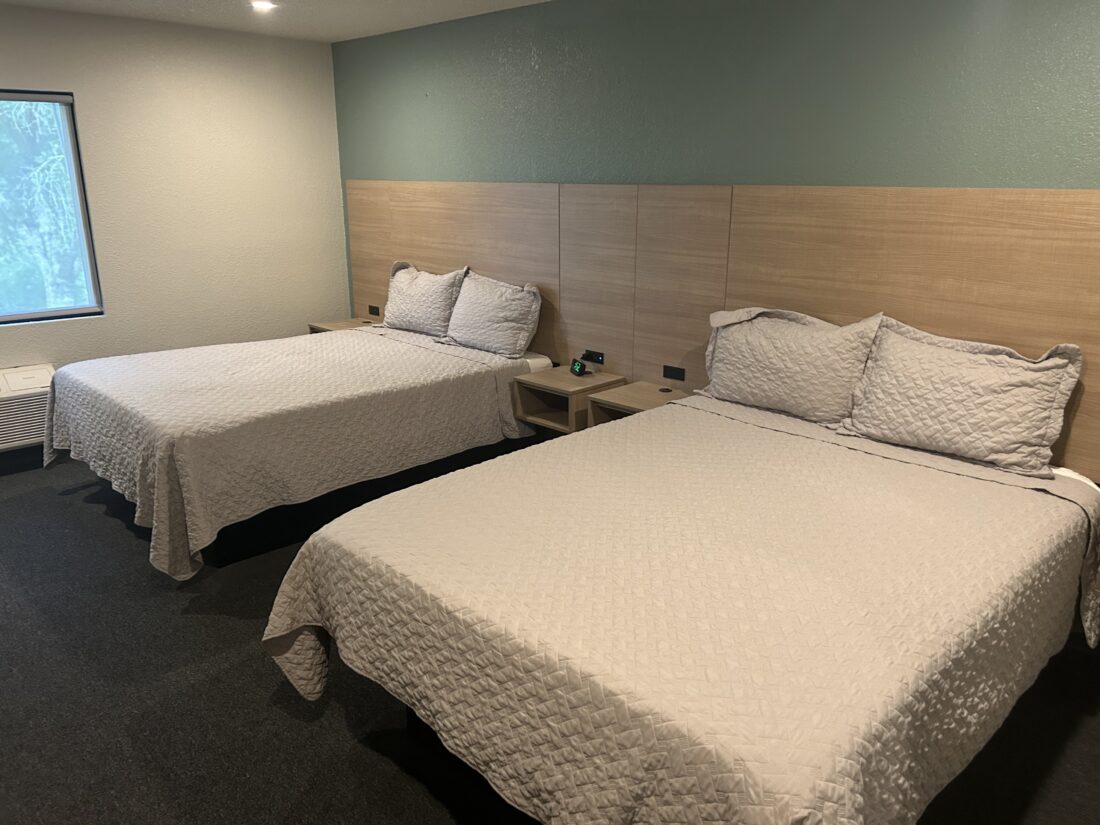
photo by: Bremen Keasey
An empty room at the Avalon Wellness and Recovery Center. The two beds have separate TVs and bluetooth headphones so that each patient can watch or use the TV to their liking even while sharing a room.
Hawley said the center uses a mix of treatment strategies to help its clients through recovery. Those strategies include individual and group therapy sessions, skill-building workshops and health and wellness education in ways that “meet them where they are at,” Hawley said.
The sessions don’t focus solely on substance abuse, either. Hawley said the care provided by its clinical team is trauma-informed and often focuses on other co-occurring mental health issues that can lead to substance abuse.
“Our care (deals) with addiction issues, the families, all these different aspects of why the patients ended up turning to substances as a solution,” Hawley said.
The biggest thing the center emphasizes is creating connections and a community during the treatment process, Hawley said. Isolation is often a driver for people falling into substance abuse, and that’s why they want to create a center that reminds people in recovery they are not alone in their journey.
“When someone feels truly alone in the world, it’s a dark place to be,” Hawley said. “We want to avoid that.”
Kenneth Vick, the executive director for Avalon, said another way the center is different is the fact that about half of its 35 employees have some kind of personal experience with substance abuse. Vick joined the team at Avalon a week before it first started treating patients, but prior to that, he worked at a variety of community health centers in Kansas City.
Vick, who is also in recovery, noted the clinical staff has about “100 combined years of recovery,” and this understanding of what patients are going through can lead to better outcomes. Vick pointed to guidance from the Substance Abuse and Mental Health Services Administration that says patients do better in treatment working with a peer specialist who’s been through substance abuse treatment before, as compared to treatment from someone who does not have that same life experience.
“It opens the door. Somebody might say ‘you don’t understand,’ but I can say, ‘eh, I kinda do,'” Vick said.
As a private treatment center, Avalon also occupies a different level of care than other local nonprofits that focus on mental health and substance abuse. Organizations like Bert Nash Community Mental Health Center and the Treatment and Recovery Center are crucial, Hawley said, but there was a missing piece in the puzzle that Avalon can fill. Those places work as “crisis centers,” but Hawley said that Avalon’s inpatient treatment can serve as a next step for people in recovery that those places can’t provide.
Vick said receiving the accreditation now means that Avalon can negotiate with health insurance companies to make sure they are an in-network center, reducing prices and eliminating a barrier that keeps many people from getting help. Still, as a private center, they aren’t able to treat people without insurance. Vick understands how some people might view Avalon as “chasing the money” of insured people, but he also sees the center as serving a crucial niche. Around 60% of people with substance use disorder still have a house and a job, Vick said. For those people, Avalon can serve as a place to catch them before they lose those things.
“We’re trying to fill that gap,” Vick said.
And by being an upstream solution, Vick thinks Avalon can help other providers like Bert Nash, the TRC and DCCCA from being “overloaded and overburdened,” making those organizations more effective at the things they do best.
Hawley said Avalon has been working with those organizations as well and is frequently meeting with them to identify what more Avalon can do. Now that the center is open, Hawley hopes to eventually expand with another facility that is open to people without insurance.
The other thing that is unique about Avalon is the building and location itself. Thakker said that because the building was once a hotel and already had bedrooms and bathrooms, it was easier to convert into an inpatient facility. Although there was extensive construction to remodel the building — for instance, by removing balconies — the bones helped make it quicker and less costly to open the center.
The other benefit of using a building that was once a hotel is that it feels more welcoming than a typical health care facility would. Hawley said it’s important to avoid feeling too “institutional,” which could lead to people not wanting to seek treatment because of stigma.
“We wanted to erase that and build a center that breaks down those barriers and makes people feel more welcome right from the get go,” Hawley said.
Avalon’s amenities make it feel like a hotel in many ways. It has a big media room with an arcade game, pool table and board games, and it also has a workout area and a spa with a sauna and cold plunge. Hawley said some people might think that is a “luxury thing,” but it also helps patients learn to feel pleasure in healthy, sustained ways — not like how drugs or alcohol impact the brain with a quick rush. Vick said there’s lots of research that suggests a sauna, cold plunge and steam room treatment “kicks up a lot of natural dopamine” — the so-called “feel-good” chemical in the brain — that can last longer than dopamine from substance use.
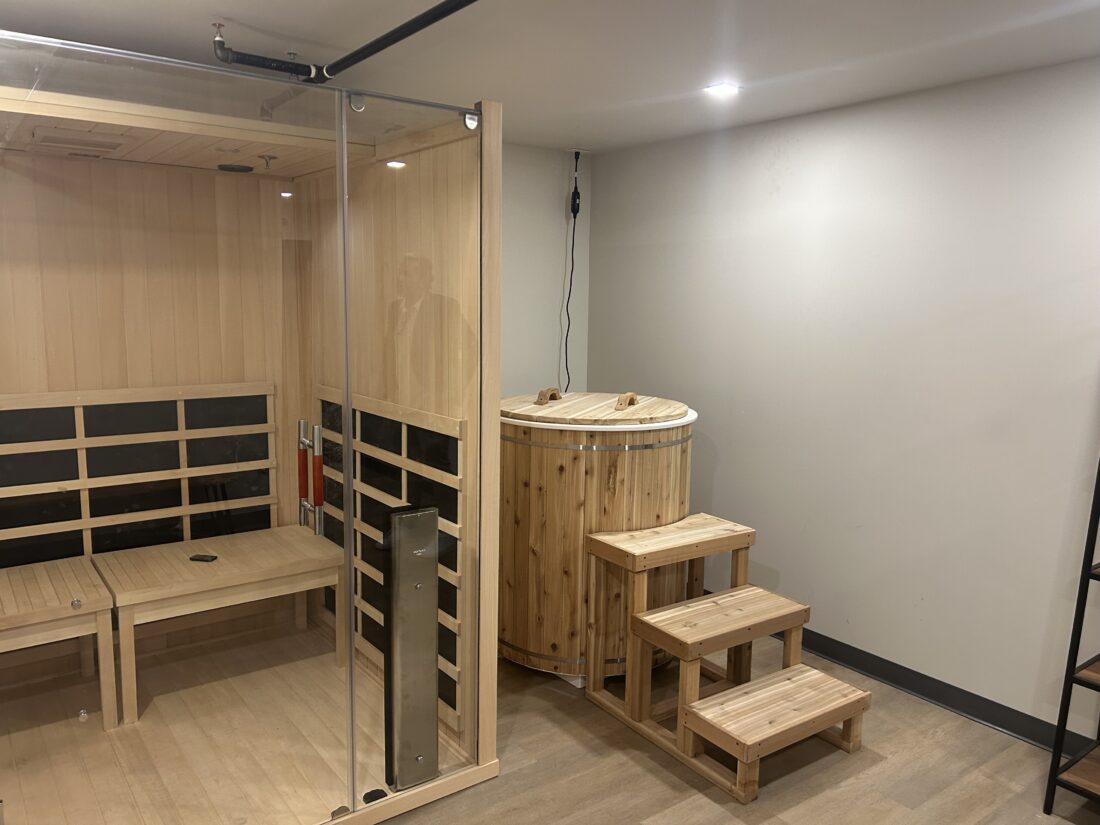
photo by: Bremen Keasey
A dry sauna and cold plunge pool at the Avalon Wellness and Recovery Center. It’s a treatment option the center’s leaders say can help patients find ways to generate natural dopamine in a way that is more sustainable than drugs.
The hotel’s transformation itself is a symbol of recovery, too. Vick said the hotel was not healthy before it was repurposed. It was a place used for drug trafficking and sex trafficking. Thakker said he heard stories from case workers who would pick clients up from the hotel and find that they were “strung out on meth.”
Multiple patients noted that they had experienced deep lows at this very hotel, Vick said. Now, it is transformed into something positive.
“We took a place that was destroying lives, and now we’re turning it into a place that rebuilds lives,” Vick said.
Although Avalon is still in its early days, the team said many of its patients are following up and wanting to give back. Thakker said people who have completed treatment have stayed in touch with the center, and they’ve even helped place people in new jobs.
That unique culture is something that Hawley thinks is crucial to the success of Avalon. When the Journal-World toured the facility with the team, Hawley said “hi” to every patient and asked how they were doing.
He noted there are some treatment centers that are large chains, with 20 centers in different parts of the country, run by hedge funds aiming to make a big return. Hawley said that the biggest focus for his team and what makes them happiest is building relationships with the patients and seeing them “do well” once they have graduated from treatment.
“We want to see good outcomes; that’s important to us,” Hawley said.
As he hopes to be able to expand Avalon to add additional facilities — like a specific men’s treatment center and a center that can accept Medicaid and Medicare patients — Hawley said the focus of the center will always be on helping people in Lawrence find a better path.
“This is all local investors,” Hawley said. “We’re doing what we can to kind of heal our communities and bring people back into a healthy place.”
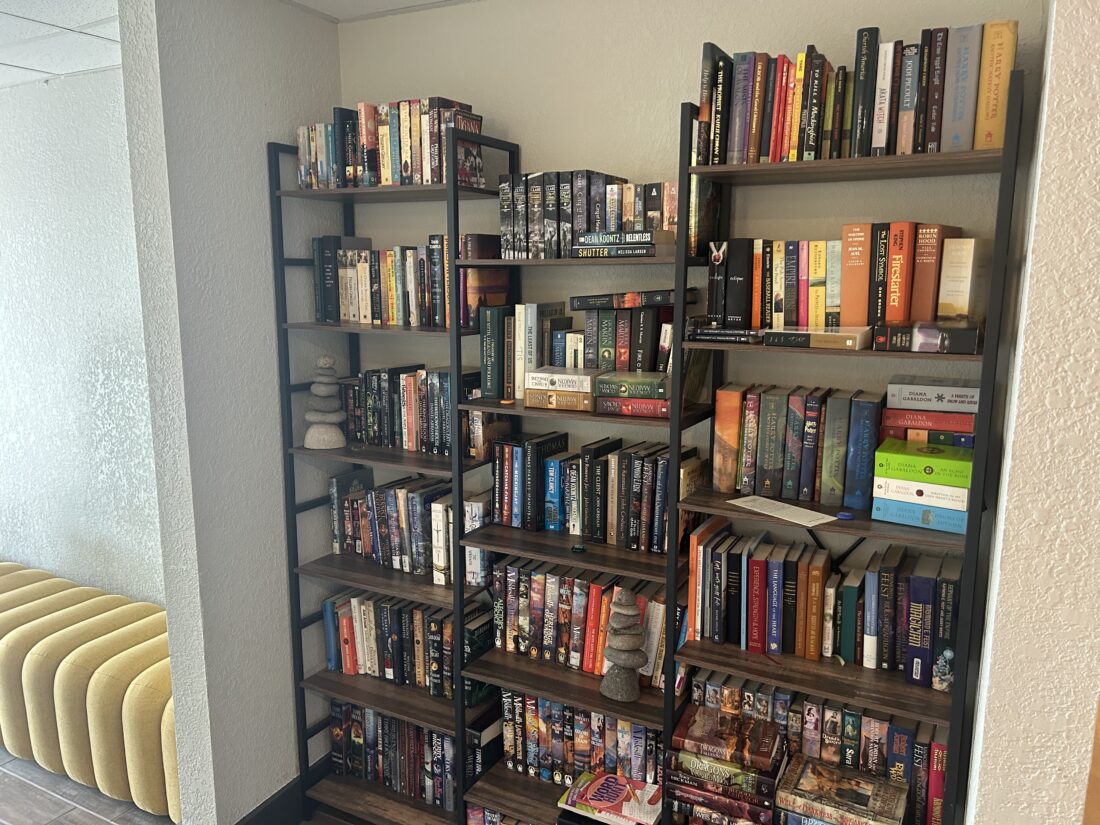
photo by: Bremen Keasey
A library at the Avalon Wellness and Recovery Center, which has a mix of self-help books and other popular books for patients to read during recovery.
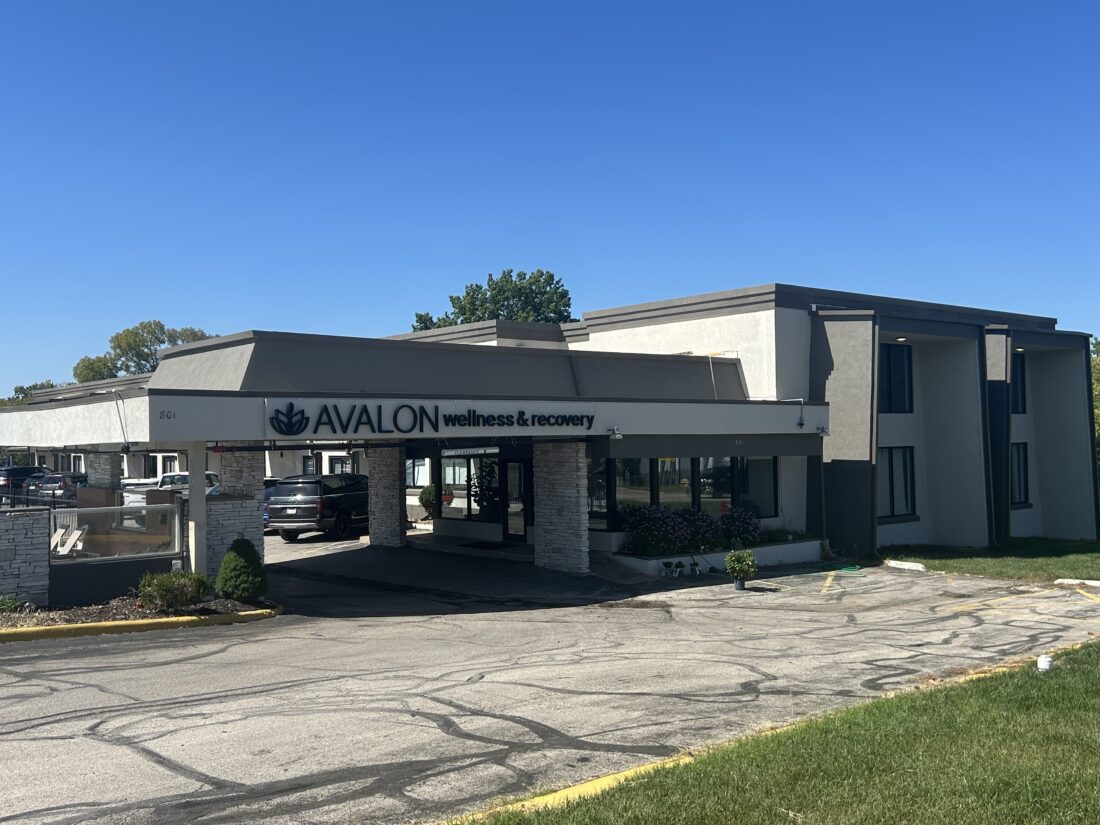
photo by: Bremen Keasey
Avalon Wellness and Recovery Center, at 801 Iowa St. in Lawrence, was a former hotel converted into a 60-bed in-patient center — Lawrence’s first.



